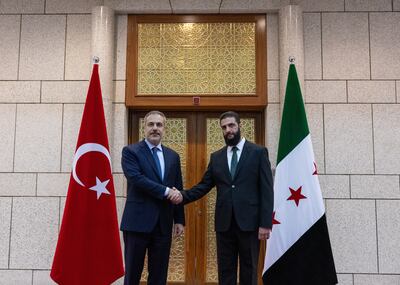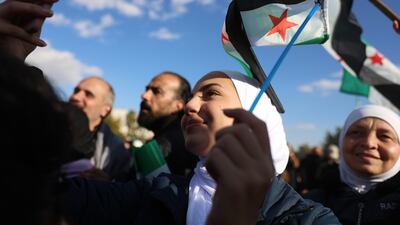As we step into the new year, I’ve noticed a stunning number of unexpected shifts, bits of news and looming developments, pointing towards a wildly unpredictable 2025.
Let’s start with the latest topsy-turvy in science and society. Climate scientists say the Arctic, the world’s famously frozen wasteland, is set to become ice-free in the near future. If the Arctic is no longer Arctic, won’t English-speakers everywhere need to find a new word to describe freezing cold weather?
After the world witnessed a backlash against over-tourism in 2024, travellers are expected to avoid many top vacation hotspots such as Venice, Santorini, Bali and beyond, instead visiting relatively unknown places like conflict-hit Kashmir. Could the next travel trend be destinations endeavouring to appear less appealing?
According to a report in The New York Times, the US government body charged with protecting its environment has for decades been knowingly promoting a fertiliser that leaves dangerous “forever chemicals” in the soil and water table. And food production researchers recently found that the back-to-nature style, organic and regenerative farming favoured by progressives is probably worse for humanity and the Earth than the industrial agriculture that’s been widely reviled for decades.
“Their artisanal grains and grass-fed beef are worse for nature than chemical-drenched corn and feedlot-fattened beef,” the author of a forthcoming book, We Are Eating the Earth, argued recently in The New York Times, “because they require much more land for each calorie they produce.”
Next up, politics, starting with the world’s most powerful office. Overcoming a younger, upstart candidate, accusations of seeking to foment a coup four years ago, and being the first former president with a felony conviction, Donald Trump cruised to an easy victory in November, stunning many prognosticators and leaving countless liberal-minded Americans seriously considering a move abroad. Will the next president shake the foundations of US democracy, or merely annoy a lot of American elites?
Israel has come full circle in terms of international opinion in the past 15 months
Now to the Middle East. I can’t recall any conflict that seemed as over as Syria’s civil war did six weeks ago, with President Bashar Al Assad, having put down an armed rebellion some time back, beginning to re-enter the regional diplomatic fold.
But, out of the blue, Hayat Tahrir Al Sham surged from Aleppo to Damascus to take power in a flash. Suddenly the Assad regime was no more, and Syria – for decades one of the region’s dark spots – is a place of hope, despite a terrorist-labelled leadership. One starts to wonder, is the best way to win a war to not fight it? For a while, at least, maybe.
Within hours of Mr Al Assad’s exit, Syrian exiles everywhere started talking about returning home, and many western governments, facing voter dissatisfaction over recently arrived immigrants, quickly halted asylum processing. Already, Turkey and Jordan have opened the border to returning Syrians and Austria is developing a massive repatriation plan. Anti-immigrant governments like that of Mr Trump might not be far behind. Are we about to witness the largest reverse migration in human history?
Speaking of Muslims in the West, December’s Christmas market attacker in Germany was a Saudi who was right-wing and anti-Islam, upending terrorist stereotypes. The attack “creates uncertainty at a time when certainties are already crumbling,” said a Der Spiegel columnist.
Next up, Israel, which has come full circle in terms of international opinion in the past 15 months. Start with October 7, when Hamas’s brutal assault led much of the world to sympathise with the Israeli people. Yet, much as the US did after the 9/11 attacks, Israel’s government stomped all over that global goodwill with the way its military bludgeoned, blasted and bulldozed Gaza in the months that followed. Now Syria’s successful revolution seems to be bringing things full circle.
With Mr Al Assad gone, Iran weakened, and Hamas and Hezbollah on their last legs, some are praising Israel’s military performance, and Reuters has described it as a “a succession of monumental wins for [Prime Minister Benjamin] Netanyahu”. On the verge of becoming an international pariah after accusations of genocide and war crimes, Israel could now emerge as the pioneer of a new style of innovative, 21st-century warfare.
Last, but certainly not least, we have Turkey. You may remember Turkish President Recep Tayyip Erdogan’s criticism of foreign involvement in other countries’ political processes. In 2015, he denounced a top US news outlet for meddling in Turkey’s affairs after it ran a critical article. “Know your place,” Mr Erdogan urged.
Three years later, the Turkish leader accused the US and Israel of interfering in the affairs of Pakistan and Iran. The year after that, when western countries criticised Turkey’s revocation of an election result, Mr Erdogan accused the US and Europe of meddling in Turkish politics. The list goes on, underscoring the Turkish leader’s strong stance on foreign political involvement.
Yet Mr Erdogan recently made clear that Turkey will not only be involved in the formation of Syria’s new government, it will play a crucial role – helping define its state structure and draft a new constitution. There are no two ways about it: Turkey is embarking on a nation-building mission in Syria, where it’s seen as the ultimate power with influence over its new leaders.
Turkey’s long-time leader has always wanted his country to be respected as a global power, and now he has before him what is often viewed as the ultimate challenge for the world’s most powerful states: nation building. No wonder we’ve seen recent reports that Mr Erdogan could seek yet another term; he surely hopes to see this through.
Here’s to hoping that 2025, and Syria, turn out better than many fear. Have yourself a Happy New Year.
Classification of skills
A worker is categorised as skilled by the MOHRE based on nine levels given in the International Standard Classification of Occupations (ISCO) issued by the International Labour Organisation.
A skilled worker would be someone at a professional level (levels 1 – 5) which includes managers, professionals, technicians and associate professionals, clerical support workers, and service and sales workers.
The worker must also have an attested educational certificate higher than secondary or an equivalent certification, and earn a monthly salary of at least Dh4,000.
How Voiss turns words to speech
The device has a screen reader or software that monitors what happens on the screen
The screen reader sends the text to the speech synthesiser
This converts to audio whatever it receives from screen reader, so the person can hear what is happening on the screen
A VOISS computer costs between $200 and $250 depending on memory card capacity that ranges from 32GB to 128GB
The speech synthesisers VOISS develops are free
Subsequent computer versions will include improvements such as wireless keyboards
Arabic voice in affordable talking computer to be added next year to English, Portuguese, and Spanish synthesiser
Partnerships planned during Expo 2020 Dubai to add more languages
At least 2.2 billion people globally have a vision impairment or blindness
More than 90 per cent live in developing countries
The Long-term aim of VOISS to reach the technology to people in poor countries with workshops that teach them to build their own device
ICC Women's T20 World Cup Asia Qualifier 2025, Thailand
UAE fixtures
May 9, v Malaysia
May 10, v Qatar
May 13, v Malaysia
May 15, v Qatar
May 18 and 19, semi-finals
May 20, final
The specs
Price: From Dh529,000
Engine: 5-litre V8
Transmission: Eight-speed auto
Power: 520hp
Torque: 625Nm
Fuel economy, combined: 12.8L/100km
BEACH SOCCER WORLD CUP
Group A
Paraguay
Japan
Switzerland
USA
Group B
Uruguay
Mexico
Italy
Tahiti
Group C
Belarus
UAE
Senegal
Russia
Group D
Brazil
Oman
Portugal
Nigeria
A cryptocurrency primer for beginners
Cryptocurrency Investing for Dummies – by Kiana Danial
There are several primers for investing in cryptocurrencies available online, including e-books written by people whose credentials fall apart on the second page of your preferred search engine.
Ms Danial is a finance coach and former currency analyst who writes for Nasdaq. Her broad-strokes primer (2019) breaks down investing in cryptocurrency into baby steps, while explaining the terms and technologies involved.
Although cryptocurrencies are a fast evolving world, this book offers a good insight into the game as well as providing some basic tips, strategies and warning signs.
Begin your cryptocurrency journey here.
Available at Magrudy’s , Dh104
Top New Zealand cop on policing the virtual world
New Zealand police began closer scrutiny of social media and online communities after the attacks on two mosques in March, the country's top officer said.
The killing of 51 people in Christchurch and wounding of more than 40 others shocked the world. Brenton Tarrant, a suspected white supremacist, was accused of the killings. His trial is ongoing and he denies the charges.
Mike Bush, commissioner of New Zealand Police, said officers looked closely at how they monitored social media in the wake of the tragedy to see if lessons could be learned.
“We decided that it was fit for purpose but we need to deepen it in terms of community relationships, extending them not only with the traditional community but the virtual one as well," he told The National.
"We want to get ahead of attacks like we suffered in New Zealand so we have to challenge ourselves to be better."
Avatar: Fire and Ash
Director: James Cameron
Starring: Sam Worthington, Sigourney Weaver, Zoe Saldana
Rating: 4.5/5
Company%20profile
%3Cp%3E%3Cstrong%3ECompany%20name%3A%20%3C%2Fstrong%3EXare%C2%A0%3C%2Fp%3E%0A%3Cp%3E%3Cstrong%3EStarted%3A%20%3C%2Fstrong%3EJanuary%2018%2C%202021%C2%A0%3C%2Fp%3E%0A%3Cp%3E%3Cstrong%3EFounders%3A%20%3C%2Fstrong%3EPadmini%20Gupta%2C%20Milind%20Singh%2C%20Mandeep%20Singh%C2%A0%3C%2Fp%3E%0A%3Cp%3E%3Cstrong%3EBased%3A%20%3C%2Fstrong%3EDubai%C2%A0%3C%2Fp%3E%0A%3Cp%3E%3Cstrong%3ESector%3A%20%3C%2Fstrong%3EFinTech%C2%A0%3C%2Fp%3E%0A%3Cp%3E%3Cstrong%3EFunds%20Raised%3A%20%3C%2Fstrong%3E%2410%20million%C2%A0%3C%2Fp%3E%0A%3Cp%3E%3Cstrong%3ECurrent%20number%20of%20staff%3A%20%3C%2Fstrong%3E28%C2%A0%3C%2Fp%3E%0A%3Cp%3E%3Cstrong%3EInvestment%20stage%3A%20%3C%2Fstrong%3Eundisclosed%3C%2Fp%3E%0A%3Cp%3E%3Cstrong%3EInvestors%3A%20%3C%2Fstrong%3EMS%26amp%3BAD%20Ventures%2C%20Middle%20East%20Venture%20Partners%2C%20Astra%20Amco%2C%20the%20Dubai%20International%20Financial%20Centre%2C%20Fintech%20Fund%2C%20500%20Startups%2C%20Khwarizmi%20Ventures%2C%20and%20Phoenician%20Funds%3C%2Fp%3E%0A
JUDAS AND THE BLACK MESSIAH
Directed by: Shaka King
Starring: Daniel Kaluuya, Lakeith Stanfield, Jesse Plemons
Four stars
Leap of Faith
Michael J Mazarr
Public Affairs
Dh67
DIVINE%20INTERVENTOIN
%3Cp%3EStarring%3A%20Elia%20Suleiman%2C%20Manal%20Khader%2C%20Amer%20Daher%3C%2Fp%3E%0A%3Cp%3EDirector%3A%20Elia%20Suleiman%3C%2Fp%3E%0A%3Cp%3ERating%3A%204.5%2F5%3C%2Fp%3E%0A
2025 Fifa Club World Cup groups
Group A: Palmeiras, Porto, Al Ahly, Inter Miami.
Group B: Paris Saint-Germain, Atletico Madrid, Botafogo, Seattle.
Group C: Bayern Munich, Auckland City, Boca Juniors, Benfica.
Group D: Flamengo, ES Tunis, Chelsea, Leon.
Group E: River Plate, Urawa, Monterrey, Inter Milan.
Group F: Fluminense, Borussia Dortmund, Ulsan, Mamelodi Sundowns.
Group G: Manchester City, Wydad, Al Ain, Juventus.
Group H: Real Madrid, Al Hilal, Pachuca, Salzburg.
Desert Warrior
Starring: Anthony Mackie, Aiysha Hart, Ben Kingsley
Director: Rupert Wyatt
Rating: 3/5
Ant-Man and the Wasp
Director: Peyton Reed
Starring: Paul Rudd, Evangeline Lilly, Michael Douglas
Three stars
TECH%20SPECS%3A%20APPLE%20WATCH%20SERIES%209
%3Cp%3E%3Cstrong%3EDisplay%3A%3C%2Fstrong%3E%2041mm%20%E2%80%93%20352%20x%20430%3B%2045mm%20%E2%80%93%20396%20x%20484%3B%20always-on%20Retina%20LTPO%20OLED%2C%202000%20nits%20max%3B%20Ion-X%20glass%20(aluminium%20cases)%2C%20sapphire%20crystal%20(stainless%20steel%20cases)%3C%2Fp%3E%0A%3Cp%3E%3Cstrong%3EProcessor%3A%3C%2Fstrong%3E%20Apple%20S9%2064-bit%2C%20W3%20wireless%2C%202nd-gen%20Ultra%20Wideband%3C%2Fp%3E%0A%3Cp%3E%3Cstrong%3ECapacity%3A%3C%2Fstrong%3E%2064GB%3C%2Fp%3E%0A%3Cp%3E%3Cstrong%3EMemory%3A%3C%2Fstrong%3E%201GB%3C%2Fp%3E%0A%3Cp%3E%3Cstrong%3EPlatform%3A%3C%2Fstrong%3E%20watchOS%2010%3C%2Fp%3E%0A%3Cp%3E%3Cstrong%3EHealth%20metrics%3A%3C%2Fstrong%3E%20Blood%20oxygen%20sensor%2C%20electrical%20heart%20sensor%20and%20ECG%2C%203rd-gen%20optical%20heart%20sensor%2C%20high%20and%20low%20heart%20rate%20notifications%2C%20irregular%20rhythm%20notifications%2C%20sleep%20stages%2C%20temperature%20sensing%3C%2Fp%3E%0A%3Cp%3E%3Cstrong%3EEmergency%20services%3A%3C%2Fstrong%3E%20Emergency%20SOS%2C%20international%20emergency%20calling%2C%20crash%20detection%2C%20fall%20detection%3C%2Fp%3E%0A%3Cp%3E%3Cstrong%3EConnectivity%3A%3C%2Fstrong%3E%20GPS%2FGPS%20%2B%20cellular%3B%20Wi-Fi%2C%20LTE%2C%20Bluetooth%205.3%2C%20NFC%20(Apple%20Pay)%3C%2Fp%3E%0A%3Cp%3E%3Cstrong%3EDurability%3A%3C%2Fstrong%3E%20IP6X%2C%20water%20resistant%20up%20to%2050m%2C%20dust%20resistant%3C%2Fp%3E%0A%3Cp%3E%3Cstrong%3EBattery%3A%3C%2Fstrong%3E%20308mAh%20Li-ion%2C%20up%20to%2018h%20regular%2F36h%20low%20power%3B%20wireless%20charging%3C%2Fp%3E%0A%3Cp%3E%3Cstrong%3ECards%3A%3C%2Fstrong%3E%20eSIM%3C%2Fp%3E%0A%3Cp%3E%3Cstrong%3EFinishes%3A%3C%2Fstrong%3E%20Aluminium%20%E2%80%93%20midnight%2C%20pink%2C%20Product%20Red%2C%20silver%2C%20starlight%3B%20stainless%20steel%20%E2%80%93%20gold%2C%20graphite%2C%20silver%3C%2Fp%3E%0A%3Cp%3E%3Cstrong%3EIn%20the%20box%3A%3C%2Fstrong%3E%20Watch%20Series%209%2C%20woven%20magnetic-to-USB-C%20charging%20cable%2C%20band%2Floop%3C%2Fp%3E%0A%3Cp%3E%3Cstrong%3EPrice%3A%3C%2Fstrong%3E%20Starts%20at%20Dh1%2C599%20(41mm)%20%2F%20Dh1%2C719%20(45mm)%3C%2Fp%3E%0A



